
Find Help
More Items From Ergsy search
-

What are the main types of eczema?
Relevance: 100%
-

Is eczema contagious?
Relevance: 77%
-
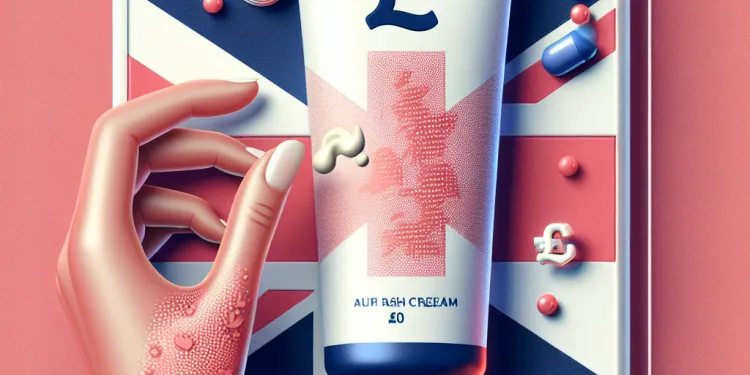
Is there a cure for eczema?
Relevance: 76%
-
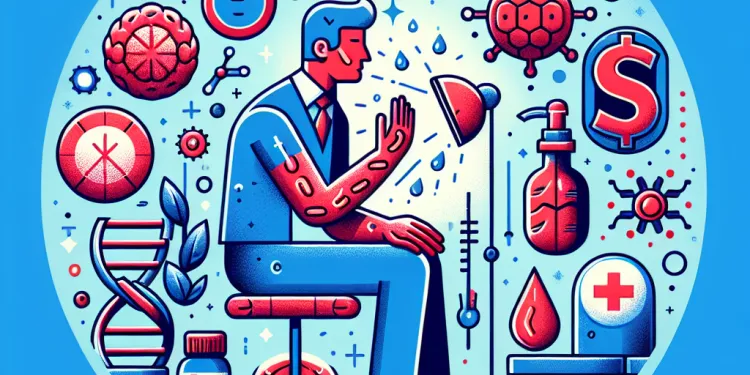
What causes eczema?
Relevance: 76%
-
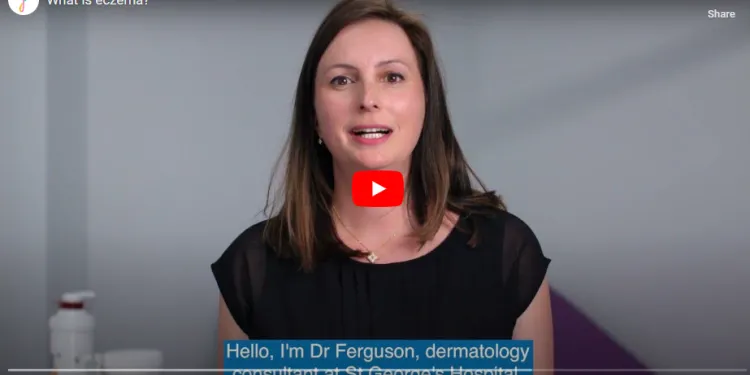
What is eczema? General Information
Relevance: 74%
-
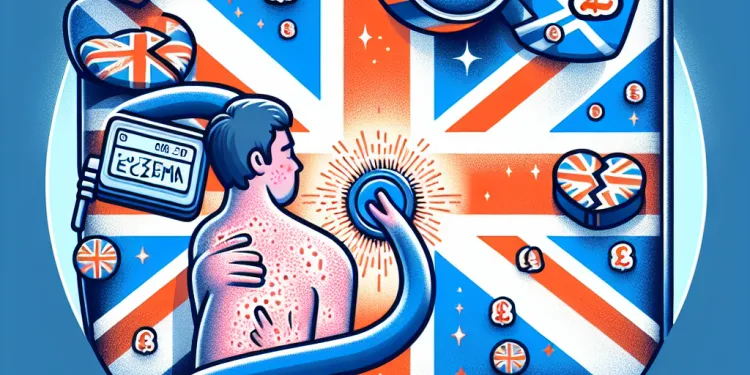
How can eczema be diagnosed?
Relevance: 72%
-
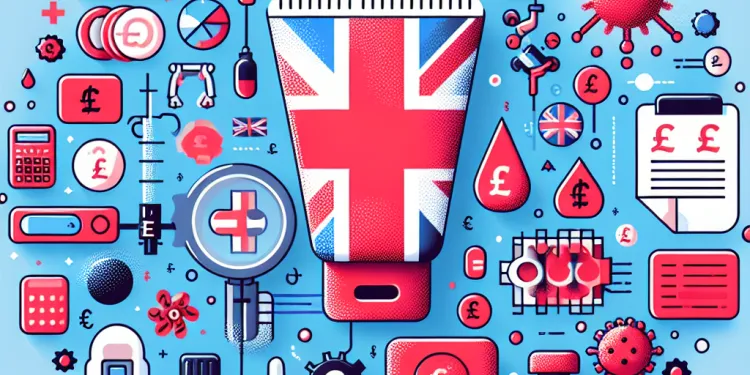
Who is at risk of developing eczema?
Relevance: 70%
-
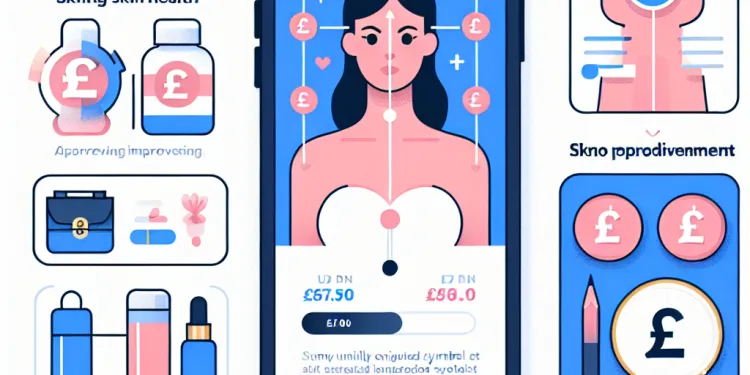
Can eczema improve with age?
Relevance: 70%
-

Can diet affect eczema?
Relevance: 70%
-

What treatments are available for eczema?
Relevance: 69%
-
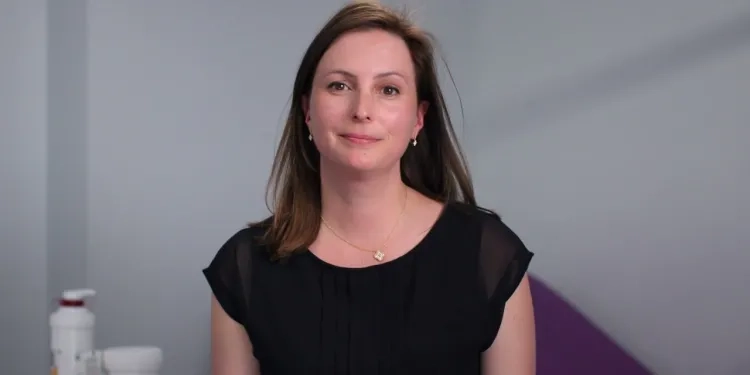
Factors that trigger eczema in your child
Relevance: 69%
-

Are there any home remedies for eczema?
Relevance: 69%
-

Eczema - Your child's appointment | Dermatology | Paediatrics
Relevance: 67%
-
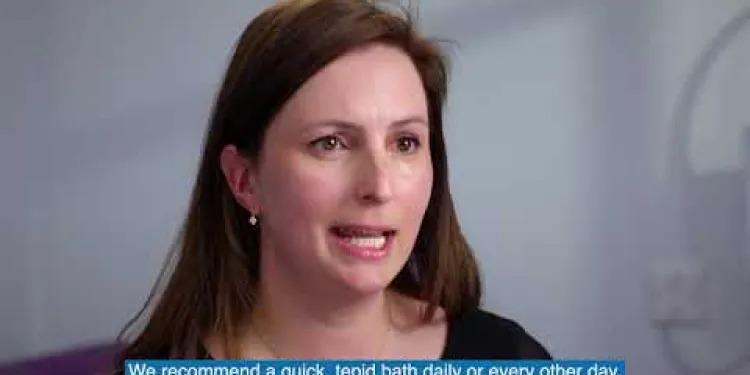
Managing and treating your child's eczema
Relevance: 67%
-

How can I prevent eczema flare-ups?
Relevance: 65%
-
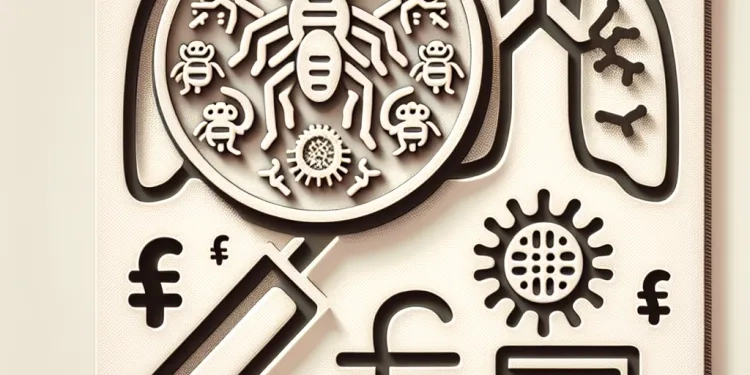
Can dust mites cause asthma and eczema?
Relevance: 60%
-
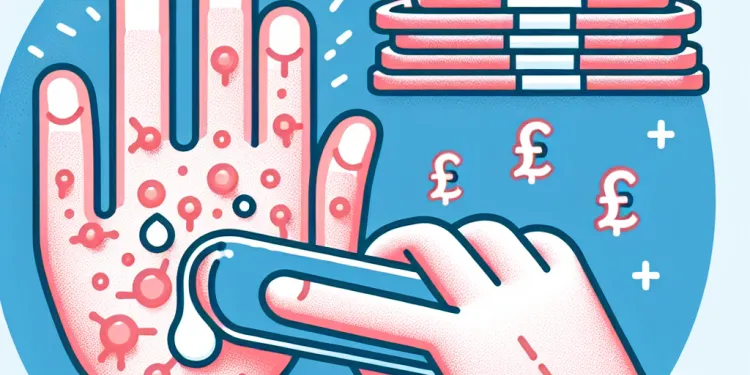
What are common symptoms of eczema?
Relevance: 51%
-

How does weather affect eczema?
Relevance: 48%
-
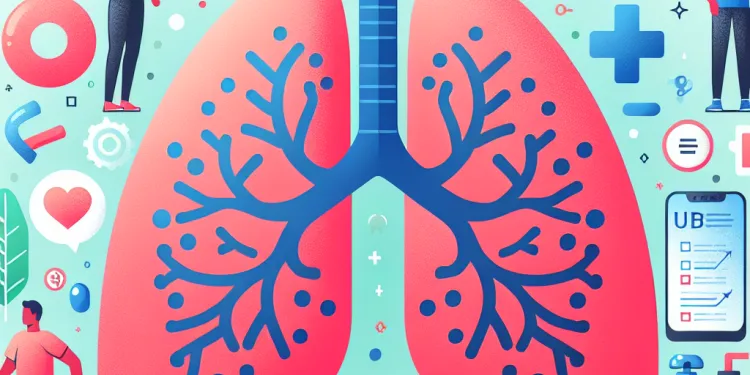
Are there different types of asthma?
Relevance: 41%
-

What is the difference between type 1 and type 2 diabetes?
Relevance: 36%
-

Type 1 Diabetes supporting adults to manage Type 1 diabetes
Relevance: 34%
-

Is Type 2 Diabetes hereditary?
Relevance: 34%
-
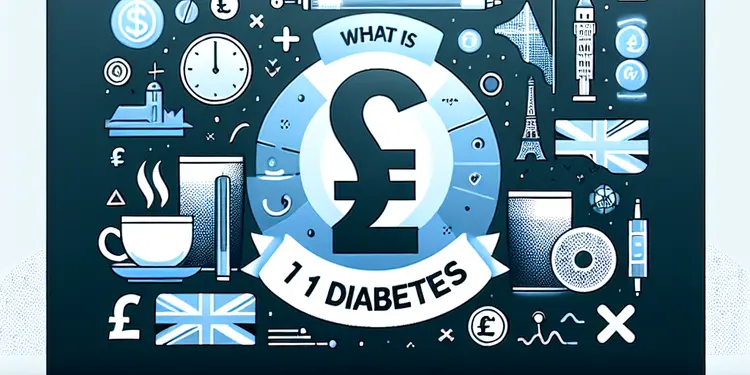
What is type 1 diabetes?
Relevance: 34%
-
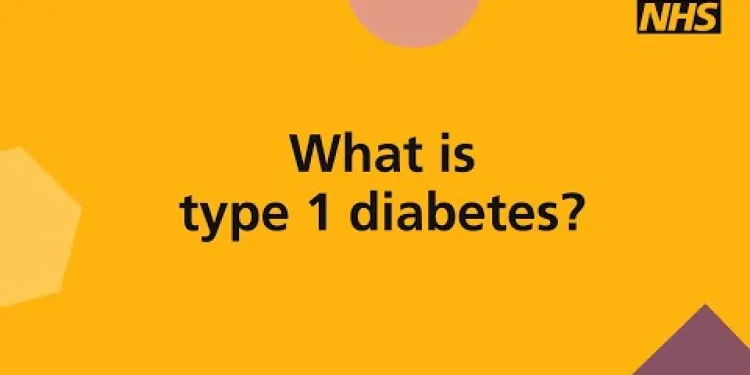
What is type 1 diabetes?
Relevance: 34%
-

Are there different types of ADHD?
Relevance: 33%
-

Is Ozempic suitable for type 1 diabetes?
Relevance: 32%
-
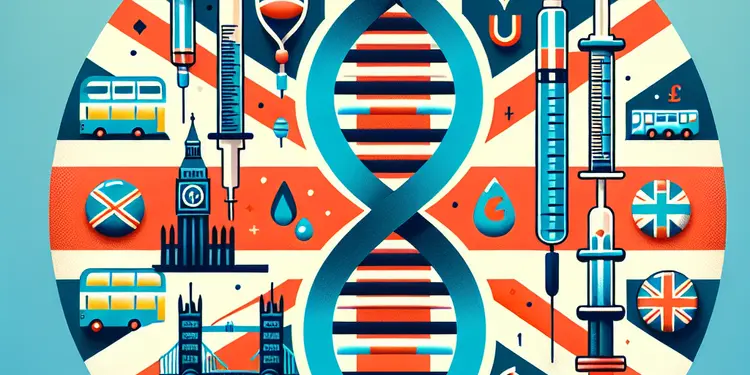
Is there a genetic predisposition to type 1 diabetes?
Relevance: 32%
-
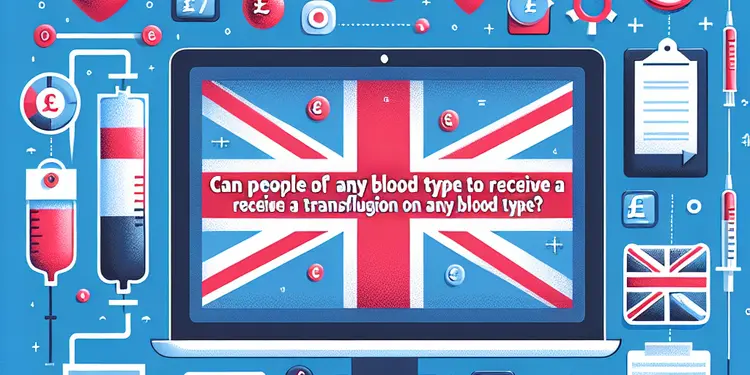
Can people of any blood type receive a transfusion of any blood type?
Relevance: 32%
-
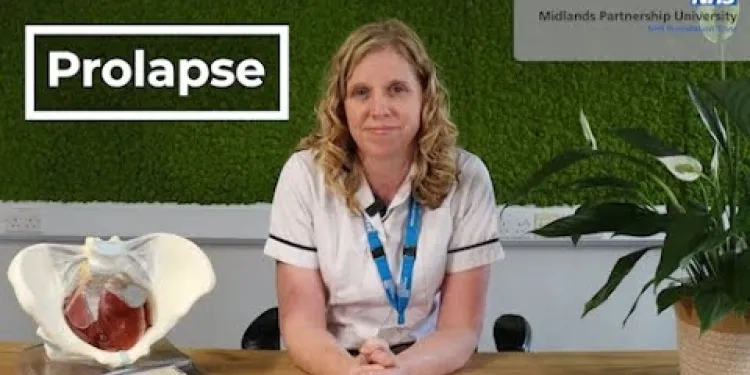
Prolapse Types and Tips
Relevance: 32%
-

Can Type 2 Diabetes go away?
Relevance: 31%
-

What causes Type 2 Diabetes?
Relevance: 31%
-

Can Type 2 Diabetes be prevented?
Relevance: 31%
-

What are the symptoms of Type 2 Diabetes?
Relevance: 31%
-
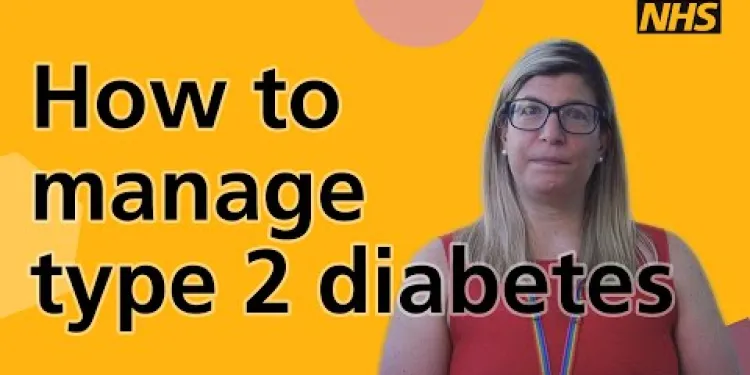
How to manage type 2 diabetes
Relevance: 31%
-

What are the types of LPA?
Relevance: 31%
-

How is Type 2 Diabetes diagnosed?
Relevance: 31%
-
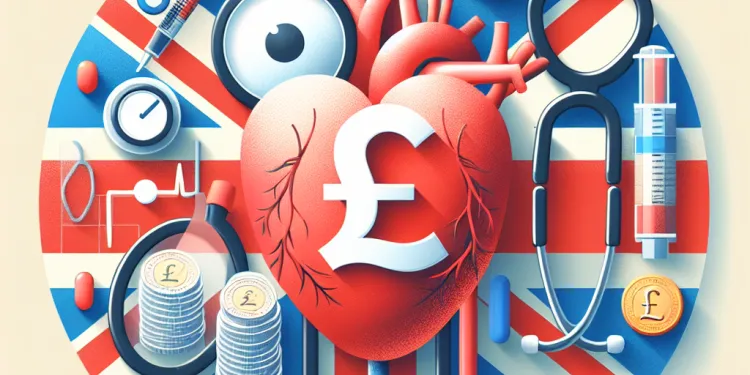
What are the types of thrombosis?
Relevance: 30%
-

Can Mounjaro be used in type 1 diabetes?
Relevance: 30%
-

What are the types of dietary fiber?
Relevance: 30%
-

What is the role of insulin in Type 2 Diabetes?
Relevance: 30%
What Are the Main Types of Eczema?
Eczema, also known as dermatitis, is a common skin condition that causes inflammation, itching, and redness. It affects many people in the UK, and knowing the types of eczema can help in seeking the right treatment and management strategies. Below are the main types of eczema:
Atopic Dermatitis
Atopic dermatitis is the most common form of eczema and is often associated with other atopic conditions like asthma and hay fever. It is prevalent among infants and young children, but it can occur at any age. The condition is characterized by dry, itchy skin and red, inflamed patches that can appear anywhere on the body. It is believed to be linked to genetic factors, immune system abnormalities, and environmental triggers.
Contact Dermatitis
Contact dermatitis is triggered by direct contact with irritants or allergens. There are two types: irritant contact dermatitis and allergic contact dermatitis. Irritant contact dermatitis is caused by substances such as detergents and solvents, while allergic contact dermatitis is a result of an allergic reaction to substances like nickel, fragrances, or latex. Symptoms include redness, itching, and burning sensations on the skin.
Discoid Eczema
Discoid eczema, also known as nummular eczema, presents as round, coin-shaped spots on the skin. These patches can be itchy, swollen, and crusty. The condition is common in adults and may be triggered by dry skin, insect bites, or changes in weather. Treatment focuses on moisturizing the skin and reducing inflammation.
Varicose Eczema
Varicose eczema, or stasis dermatitis, affects the lower legs and is associated with poor circulation and varicose veins. It is more common in older adults and can cause symptoms like itching, swelling, and darkening of the skin. Managing the underlying vein condition and using emollients can help alleviate symptoms.
Seborrheic Dermatitis
Seborrheic dermatitis affects areas with a high concentration of oil glands, such as the scalp, face, and chest. It manifests as red, scaly patches and dandruff. While the exact cause is unknown, factors like yeast overgrowth and hormonal changes are believed to play a role. Treatment may include antifungal creams and medicated shampoos.
Dyshidrotic Eczema
Dyshidrotic eczema is characterized by small, blisters that develop on the palms of the hands and soles of the feet. These blisters are often itchy and can be painful. Stress, allergies, and exposure to metals may trigger outbreaks. Keeping skin moisturized and avoiding triggers are essential parts of managing this type of eczema.
Recognizing the type of eczema is crucial for effective management. Consultation with healthcare professionals can provide accurate diagnosis and tailored treatment plans. Moisturizing regularly, avoiding known triggers, and using appropriate medications or therapies can help control the symptoms and improve quality of life for those affected by eczema in the UK.
What Are the Main Types of Eczema?
Eczema is a skin problem that makes your skin red, itchy, and sore. Many people in the UK have it. Knowing the different types can help you get the right help. Here are the main types of eczema:
Atopic Dermatitis
Atopic dermatitis is the most common type of eczema. People with this type may also have asthma or hay fever. It usually starts in babies and kids, but anyone can get it. It causes dry, itchy, red patches that can appear anywhere on your body. It happens because of genes, problems with the immune system, and things around you.
Contact Dermatitis
Contact dermatitis happens when your skin touches something that causes a reaction. There are two types: irritant contact dermatitis is caused by things like soap, and allergic contact dermatitis is caused by things like nickel or certain perfumes. It causes red, itchy, and burning skin.
Discoid Eczema
Discoid eczema, or nummular eczema, looks like round spots on the skin. These spots can be itchy, swollen, and crusty. It often affects adults and might be caused by dry skin, bug bites, or weather changes. Treatment includes moisturizing and reducing swelling.
Varicose Eczema
Varicose eczema affects your lower legs. It is linked to poor blood flow and vein problems, mostly in older adults. Symptoms include itching, swelling, and dark skin. Taking care of your veins and keeping skin soft can help.
Seborrheic Dermatitis
Seborrheic dermatitis affects oily areas like the scalp, face, and chest. It causes red, scaly patches and dandruff. The exact cause is not known, but it might be from yeast or hormone changes. Treatment often includes special creams and shampoos.
Dyshidrotic Eczema
Dyshidrotic eczema causes small blisters on hands and feet. These can be very itchy and sometimes hurt. Stress, allergies, and metals can cause them. It helps to keep skin moist and stay away from things that trigger it.
Knowing which type of eczema you have is important. Doctors can help find out what type you have and how to treat it. Keeping skin moisturized, avoiding triggers, and using medicines can help manage eczema and make life better.
Frequently Asked Questions
What is eczema?
Eczema, also known as atopic dermatitis, is a common inflammatory skin condition characterized by itchy, red, and inflamed skin.
How many main types of eczema are there?
There are several main types of eczema, including atopic dermatitis, contact dermatitis, dyshidrotic eczema, nummular eczema, seborrheic dermatitis, and stasis dermatitis.
What is atopic dermatitis?
Atopic dermatitis is a chronic form of eczema that usually starts in childhood and is characterized by itchy, inflamed patches of skin.
What is contact dermatitis?
Contact dermatitis is a type of eczema that occurs when skin comes into contact with an irritant or allergen, leading to redness and irritation.
What is dyshidrotic eczema?
Dyshidrotic eczema, also known as dyshidrosis, is characterized by small, itchy blisters on the edges of the fingers, toes, palms, and soles of the feet.
What is nummular eczema?
Nummular eczema presents as round, coin-shaped patches of irritated skin, often intensely itchy and can be mistaken for fungal infections or ringworm.
What is seborrheic dermatitis?
Seborrheic dermatitis is a type of eczema that affects areas of the body with many oil-producing glands, like the scalp and face, and is associated with dandruff.
What is stasis dermatitis?
Stasis dermatitis is caused by poor circulation in the lower legs, leading to swelling, redness, and itchiness, often accompanying varicose veins.
Can eczema be cured?
There is no cure for eczema, but it can be managed with proper treatment and lifestyle changes to reduce symptoms and prevent flare-ups.
What are common triggers for eczema flare-ups?
Common triggers include allergens, irritants, stress, hormonal changes, and environmental factors such as dry weather or temperature extremes.
How is eczema diagnosed?
Eczema is usually diagnosed based on the appearance of the skin and the patient’s medical history. A dermatologist may perform a patch test to identify allergens.
Are there any natural remedies for eczema?
Natural remedies include moisturizing with oils like coconut oil, reducing stress, taking oatmeal baths, and using products with natural ingredients to soothe the skin.
How important is moisturizing for eczema?
Moisturizing is crucial for eczema management, as it helps protect the skin barrier, retain moisture, and reduce dryness and itchiness.
What lifestyle changes can help manage eczema?
Lifestyle changes include avoiding triggers, wearing soft, breathable clothing, maintaining a consistent skincare routine, and managing stress levels.
Can diet affect eczema?
Some people find that certain foods can trigger eczema or make symptoms worse. Identifying and avoiding these foods might be helpful for some individuals.
What role does stress play in eczema?
Stress is a known trigger for eczema flare-ups. Managing stress through techniques like meditation, exercise, and counseling may help control symptoms.
Are there specific treatments for each type of eczema?
Treatment varies by type and severity but generally includes topical treatments, moisturizers, and lifestyle changes. Some require medication or light therapy.
Is eczema contagious?
No, eczema is not contagious. It cannot be spread from person to person through contact.
What are common symptoms of eczema?
Common symptoms include dry, sensitive skin, redness, inflammation, itching, and patches that may blister or crack.
Can children outgrow eczema?
Many children may see an improvement in their eczema as they grow older, but some continue to have symptoms into adulthood.
What is eczema?
Eczema is when your skin gets red, itchy, and sometimes bumpy.
If you have eczema, your skin might feel dry and sore.
To help with eczema, you can use creams to keep your skin soft.
If your skin is very itchy, you can visit a doctor for help.
Wearing soft clothes can also make your skin feel better.
Eczema is a skin problem. It is also called atopic dermatitis. It makes your skin itchy, red, and sore.
How many main kinds of eczema are there?
Eczema is a skin problem that makes your skin itchy and red.
There are a few main kinds of eczema. Let's look at them.
You can use pictures or get help from an adult to understand better.
There are different kinds of eczema. Eczema is when your skin gets itchy and red. Here are some types:
- Atopic dermatitis: This makes your skin very itchy and dry.
- Contact dermatitis: This happens when something touches your skin and makes it red and sore.
- Dyshidrotic eczema: This gives you small, itchy blisters on your hands and feet.
- Nummular eczema: This causes coin-shaped spots on your skin.
- Seborrheic dermatitis: This makes your skin flaky and can look yellow.
- Stasis dermatitis: This happens when blood doesn’t flow well in your legs, making the skin itchy and sore.
If reading this feels hard, you can try some tips to help. Try reading with a finger to keep your place, or read out loud to understand better.
What is atopic dermatitis?
Atopic dermatitis is a skin problem. It can make your skin itchy and red. It is also called eczema.
If you have it, your skin might feel sore and dry. It can show up on your face, hands, and other parts of your body.
To help your skin feel better, you can use creams. Ask a grown-up to help you find the right one. You can also wear soft clothes to feel more comfortable.
Atopic dermatitis is a skin problem. It is a type of eczema. It often starts when you are a child. It makes your skin itchy and red.
What is contact dermatitis?
Contact dermatitis is when your skin gets red and sore because you touched something.
Here are some ways to help:
- Avoid touching things that make your skin sore.
- Wash your skin with water if it feels itchy.
- Talk to a doctor if it doesn't get better.
Contact dermatitis is a kind of skin problem. It happens when something touches the skin and makes it red and itchy. This can happen because of a thing that bothers the skin or something you are allergic to.
What is dyshidrotic eczema?
Dyshidrotic eczema is a skin problem. It makes small, itchy blisters on your hands and feet.
People may need help to manage it. Seeing a doctor can help.
Using cool compresses or special creams can make the skin feel better.
Dyshidrotic eczema is a skin problem. It is also called dyshidrosis. It gives you small, itchy blisters. These blisters can show up on your fingers, toes, palms, and the bottoms of your feet.
What is Nummular Eczema?
Nummular eczema is a skin problem. It makes round, itchy patches on the skin. These patches can look like coins.
If you have nummular eczema, your skin can feel dry and rough. It might get red and swollen.
To help with nummular eczema:
- Use moisturizer on your skin every day.
- Avoid hot showers or baths. Use warm water instead.
- Wear soft clothes that do not scratch your skin.
- If your skin feels itchy, avoid scratching. Try tapping or rubbing gently.
You can also ask a doctor for help. They might give you a special cream to help your skin heal.
Nummular eczema looks like round, coin-shaped spots on your skin. These spots can be very itchy. Sometimes people think it is a fungus or ringworm, but it is not.
Taking care of your skin and using gentle skin creams can help. An adult or doctor can help you find the best treatment.
What is seborrheic dermatitis?
Seborrheic dermatitis is a skin problem. It makes your skin red, itchy, and flaky. You might see it on your scalp, face, or other body parts. It's like having really bad dandruff.
If you have this problem, there are things you can do to help:
- Use a gentle shampoo.
- Try using creams that help with itching.
- If it doesn't get better, ask a doctor for advice.
Remember, you are not alone. Many people have this, and there are ways to feel better.
Seborrheic dermatitis is a skin problem. It happens in places with a lot of oil, like your scalp and face. It is often linked to dandruff, which is flaky skin.
What is stasis dermatitis?
Stasis dermatitis is a skin problem.
It happens when blood does not move well in the legs.
When blood doesn't flow right, skin can become red, dry, and itchy.
Supportive tools: Use pictures and simple words to help understand.
Stasis dermatitis happens when blood doesn't flow well in the lower legs. This can make your legs swell, turn red, and feel itchy. It often happens with varicose veins.
Can eczema be cured?
Eczema is a skin problem. It makes you itchy and uncomfortable. Right now, there is no cure for eczema. That means we cannot make it go away forever.
But don't worry! There are ways to help. You can use creams and take baths to feel better. Some people also use special medicine from a doctor.
Here are some tips to help with eczema:
- Use gentle soap.
- Moisturize your skin often.
- Wear soft clothes.
If eczema bothers you, talk to a doctor. They can help you find the best way to feel better.
Eczema cannot be completely fixed, but you can feel better with the right care and changes in daily habits to help stop the itching and redness.
What makes eczema worse?
Things that can cause problems are stuff like allergies, stuff that irritates you, feeling stressed, changes in your body, and things around you like dry weather or really hot or cold temperatures.
How do doctors know you have eczema?
Doctors figure out if you have eczema by looking at your skin and asking about your health. A skin doctor, called a dermatologist, might do a simple test to see what things make your skin react.
Can I use things from nature to help my eczema?
Here are some ways to help your skin feel better:
- You can use coconut oil to make your skin soft and moist.
- Try to do things that make you feel calm and happy.
- You can take a bath with oatmeal to help your skin.
- Use creams or lotions that have natural stuff to make your skin feel nice.
Why is it important to use cream for eczema?
Moisturizing is very important for taking care of eczema. It helps keep your skin safe, holds in moisture, and makes your skin less dry and itchy.
What can you do in your daily life to help with eczema?
Here are some things you can change to feel better:
- Stay away from things that cause problems.
- Wear clothes that are soft and let your skin breathe.
- Take care of your skin every day in the same way.
- Try to stay calm and not get too worried.
Using pictures or making a list can help you remember these tips!
Can Food Change Your Skin Problem?
Some food can make skin problems better or worse.
If you think food is making your skin itchy, it can help to:
- Write down what you eat and how your skin feels.
- Talk to a doctor. They can help you find out more.
Some people notice that certain foods make their skin problem, called eczema, worse. It can help to find out which foods do this and try not to eat them.
How does stress affect eczema?
Stress can make eczema worse. When you feel worried, your skin might itch more. Try to stay calm and relaxed. This can help your skin feel better.
Here are some things that might help you relax:
- Take deep breaths and count to ten slowly.
- Do something fun, like drawing or listening to music.
- Talk to a friend or family member about how you feel.
- Try gentle exercises, like stretching or walking.
Stress can make eczema worse. You can try to feel less stressed by doing things like meditating, exercising, or talking to a counselor. These things might help your eczema get better.
Do different types of eczema need different treatments?
Treatment depends on what type you have and how bad it is. Usually, it includes creams you put on your skin, lotions to keep your skin soft, and changes in how you live. Some people might need medicine or light therapy.
Can you catch eczema from someone else?
No, eczema is not something you can catch. It does not spread from one person to another by touching.
What are common signs of eczema?
Eczema is a skin problem. It can make your skin itchy and red. It can also cause dry and cracked skin.
If you think you have eczema, it is a good idea to see a doctor. Drawing or using a feelings chart can help you explain how you feel to the doctor.
Parents or helpers can use picture cards or apps to explain eczema. They can also read books together about eczema.
The common signs are:
- Dry skin that feels sensitive.
- Skin that turns red.
- Swelling in some areas.
- Skin that feels itchy.
- Patches on the skin that might get blisters or cracks.
If you find it hard to read, try using tools that speak text out loud. You can also ask someone you trust for help.
Will children stop having eczema as they grow up?
As kids grow up, their skin problems called eczema might get better. But some kids still have eczema when they are grown up.
Useful Links
This website offers general information and is not a substitute for professional advice.
Always seek guidance from qualified professionals.
If you have any medical concerns or need urgent help, contact a healthcare professional or emergency services immediately.
Some of this content was generated with AI assistance. We’ve done our best to keep it accurate, helpful, and human-friendly.
- Ergsy carfully checks the information in the videos we provide here.
- Videos shown by Youtube after a video has completed, have NOT been reviewed by ERGSY.
- To view, click the arrow in centre of video.
- Most of the videos you find here will have subtitles and/or closed captions available.
- You may need to turn these on, and choose your preferred language.
- Go to the video you'd like to watch.
- If closed captions (CC) are available, settings will be visible on the bottom right of the video player.
- To turn on Captions, click settings .
- To turn off Captions, click settings again.
More Items From Ergsy search
-

What are the main types of eczema?
Relevance: 100%
-

Is eczema contagious?
Relevance: 77%
-

Is there a cure for eczema?
Relevance: 76%
-

What causes eczema?
Relevance: 76%
-

What is eczema? General Information
Relevance: 74%
-

How can eczema be diagnosed?
Relevance: 72%
-

Who is at risk of developing eczema?
Relevance: 70%
-

Can eczema improve with age?
Relevance: 70%
-

Can diet affect eczema?
Relevance: 70%
-

What treatments are available for eczema?
Relevance: 69%
-

Factors that trigger eczema in your child
Relevance: 69%
-

Are there any home remedies for eczema?
Relevance: 69%
-

Eczema - Your child's appointment | Dermatology | Paediatrics
Relevance: 67%
-

Managing and treating your child's eczema
Relevance: 67%
-

How can I prevent eczema flare-ups?
Relevance: 65%
-

Can dust mites cause asthma and eczema?
Relevance: 60%
-

What are common symptoms of eczema?
Relevance: 51%
-

How does weather affect eczema?
Relevance: 48%
-

Are there different types of asthma?
Relevance: 41%
-

What is the difference between type 1 and type 2 diabetes?
Relevance: 36%
-

Type 1 Diabetes supporting adults to manage Type 1 diabetes
Relevance: 34%
-

Is Type 2 Diabetes hereditary?
Relevance: 34%
-

What is type 1 diabetes?
Relevance: 34%
-

What is type 1 diabetes?
Relevance: 34%
-

Are there different types of ADHD?
Relevance: 33%
-

Is Ozempic suitable for type 1 diabetes?
Relevance: 32%
-

Is there a genetic predisposition to type 1 diabetes?
Relevance: 32%
-

Can people of any blood type receive a transfusion of any blood type?
Relevance: 32%
-

Prolapse Types and Tips
Relevance: 32%
-

Can Type 2 Diabetes go away?
Relevance: 31%
-

What causes Type 2 Diabetes?
Relevance: 31%
-

Can Type 2 Diabetes be prevented?
Relevance: 31%
-

What are the symptoms of Type 2 Diabetes?
Relevance: 31%
-

How to manage type 2 diabetes
Relevance: 31%
-

What are the types of LPA?
Relevance: 31%
-

How is Type 2 Diabetes diagnosed?
Relevance: 31%
-

What are the types of thrombosis?
Relevance: 30%
-

Can Mounjaro be used in type 1 diabetes?
Relevance: 30%
-

What are the types of dietary fiber?
Relevance: 30%
-

What is the role of insulin in Type 2 Diabetes?
Relevance: 30%


